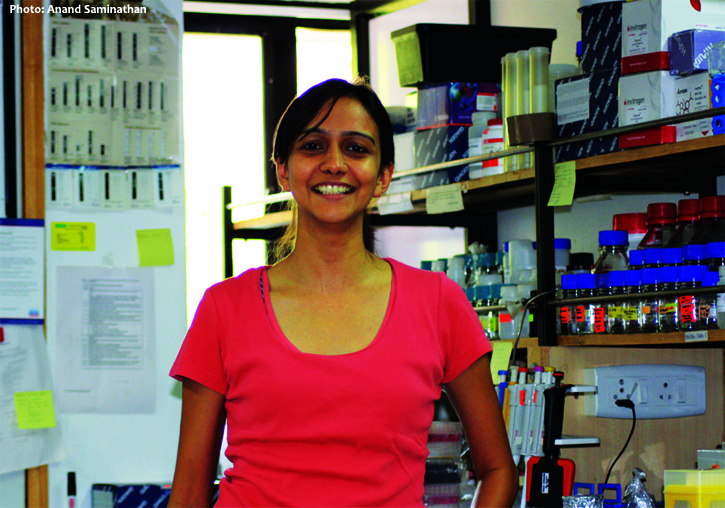Sunaina Surana wins Malhotra Weikfield Foundation NanoScience Fellowship Award
NCBS Senior research scholar Sunaina Surana won the Malhotra Weikfield Foundation NanoScience Fellowship Award for the year 2013 in the 6th Bangalore INDIA NANO Awards held on 5th and 6th December 2013. She received the award from Bharat Ratna Dr. C. N. R. Rao. Surana won the Fellowship for her doctoral work which she summarized in her poster A DNA Nanomachine Maps Spatiotemporal pH Changes in a Multicellular Living Organism at the event.
The research presented in the poster is part of Surana's ongoing doctoral research with her supervisor Dr. Yamuna Krishnan, assistant professor at the National Centre for Biological Sciences (NCBS). The work published in Nature Communications in 2011 comprised of developing, creating and testing the operation of a DNA nanomachine (which they have named the I-Switch) inside a nematode (Caenorhabditis elegans) belonging to the family of roundworms. They created the I-Switch, a DNA-based sensor, to measure the spatial and temporal changes in acidity that occurs during endocytosis (a process in which a cell absorbs molecules by engulfing them). Surana, Krishnan and their colleagues configured the nanomachine to use the principle of flourescence resonance energy transfer (FRET), a kind of energy transmission between two molecules that is radiation-free and depends on the distance between molecules. FRET is extremely sensitive over small distances, making it an especially effective tool in nano research.
"The Krishnan lab focuses on DNA structural nanotechnology, where we use the basic properties of DNA structure to build complex nanodevices," says Surana. "We feel that DNA nanostructures can be used in living systems to tease apart biology that is otherwise difficult to do using traditional probes. It was with this idea that we used the I-switch to see whether it indeed functions in a multicellular organism."
The results piqued the team's interest. They noticed that their nanodevice remained functional even inside the body of their model organism. "What we observed was that the I-Switch is targeted to coelomocytes, or the scavenger cells of the worm. Here it was internalized (engulfed) due to its negative charge and it marked the endosomes." Endosomes are small compartment-like cellular organelles where substances including proteins are sorted. They undergo several stages: early endosomes mature to form late endosomes, during which time a whole suite of cellular reactions takes place. A lot of these reactions are characterized by changes in acidity - which is where Surana and team's nanodevice comes in handy, quantifying changes as they happen. This helps shed light on important processes such as the movement of proteins to different parts of a cell, which endosomes accomplish with the aid of small bubble-like cell organelles called endocytic vesicles. "Once inside these endocytic vesicles, the DNA nanostructure is capable of mapping pH changes associated with endosomal maturation," adds Surana.
What is astonishing about the nanomachine is that it is autonomous: it is self-sufficient and works incredibly well within the living organism it is embedded in, the nematode. "It does not undergo any compromise in sensitivity even in this complex multicellular milieu," says Surana. The team's invention therefore, has numerous implications in the field of nanotechnology and subsequently, biomedical research, since their nanodevice can be used to explore and understand complex biological phenomena within organisms.
It is in recognition of these implications that awards have come knocking. "This work was also presented as a poster at the 79th Conference of the Society of Biological Chemists (India), held at Indian Institute of Science in 2010, where it won the Best Poster Award," says Surana.
The latest, the Malhotra Weikfield Foundation NanoScience Fellowship Award is also a prestigious one, for the Bangalore INDIA NANO Exhibition is one of Asia's biggest annual nanoscience and nanotech events. Inaugurated by the Chief Minister of Karnataka, Shri. Siddaramaiah, the conference spanned talks, discussions, poster presentations and international exhibits. Delegates from eleven countries participated in the event. The Malhotra Weikfield Foundation NanoScience Fellowship Award that Surana won consists of a cash prize of ₹ 50,000. "It feels nice to be honoured with the award, especially since Dr. C.N.R Rao was on the panel that selected the awardees," says Surana. "DNA nanotechnology in living systems is a field that is still in its infancy, and for this work to be recognized, underscores the potential importance of this field."

Comments
Post new comment